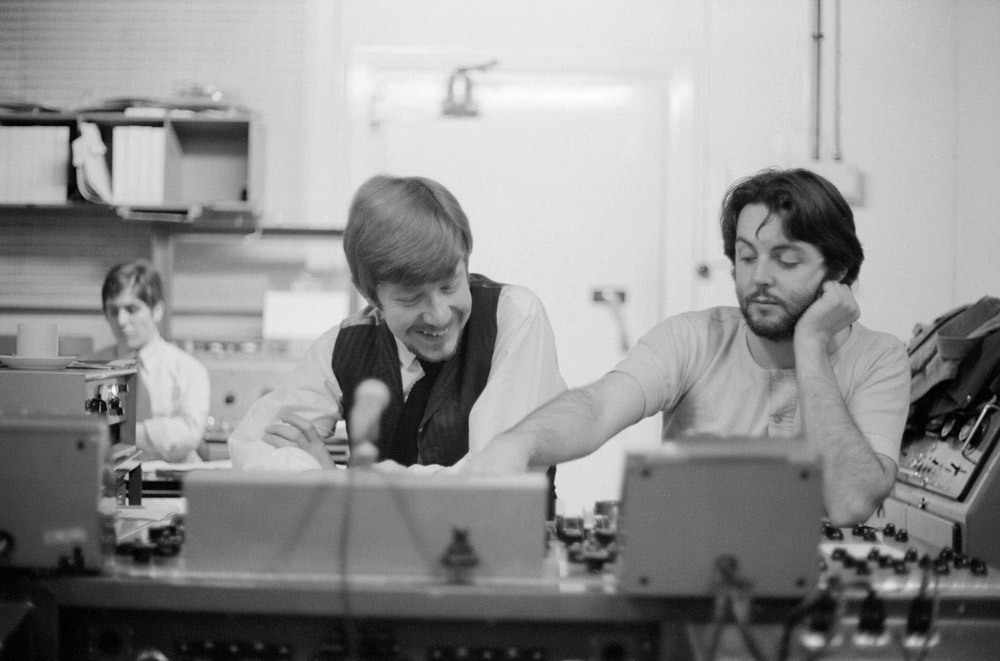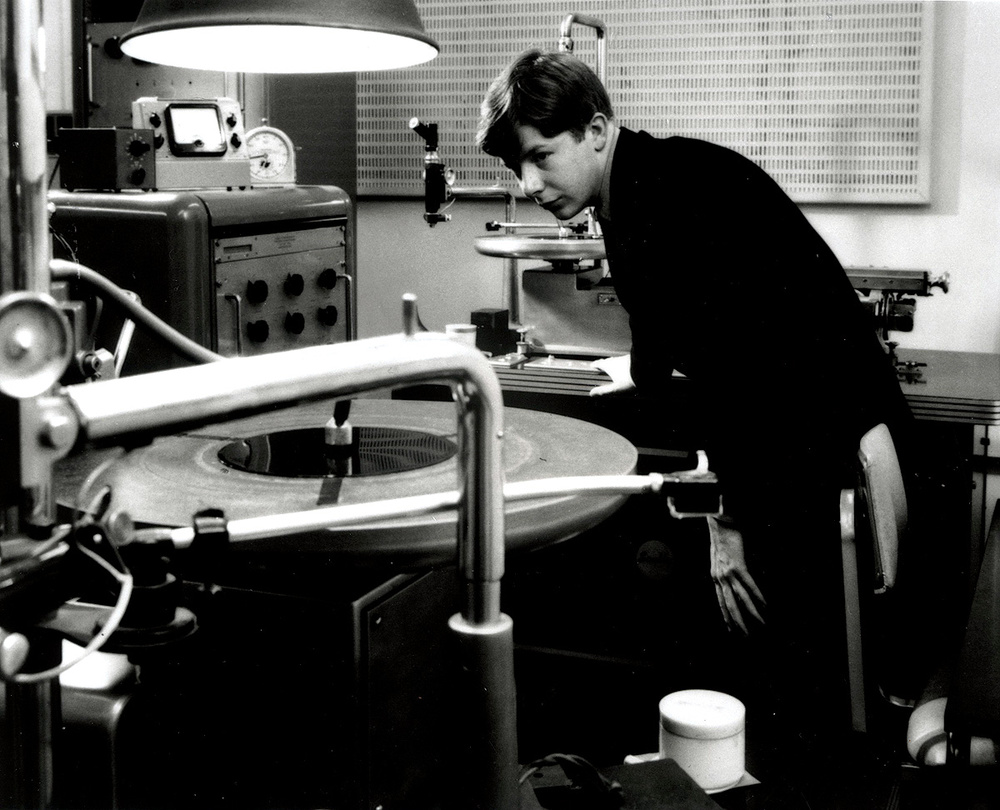Born Apr 20, 1947
Ken Scott
The Beatles circle
Photo: From https://www.soundonsound.com/people/beatles-while-my-guitar-gently-weeps
Last updated on April 8, 2023
Born Apr 20, 1947
The Beatles circle
Photo: From https://www.soundonsound.com/people/beatles-while-my-guitar-gently-weeps
Last updated on April 8, 2023
Beatles’ recording engineer Ken Scott reveals behind the scenes details on working with The Fab Four
Jul 25, 2012 • From DAYTRIPPIN' BEATLES MAGAZINE
Interview: Ken Scott - Recording with The Beatles & Inside the Studio
Feb 25, 2010 • From PremierGuitar
From Wikipedia:
Ken Scott (born 20 April 1947) is a British record producer and engineer known for being one of the five main engineers for the Beatles, as well as engineering Elton John, Pink Floyd, Procol Harum, Mahavishnu Orchestra, Duran Duran, the Jeff Beck Group and many more. As a producer, Scott is noted for his work with David Bowie, Supertramp, Devo, Kansas, the Tubes, Ronnie Montrose, Level 42, among others.
Scott was also influential in the evolution of jazz rock, pioneering a harder rock sound through his work with Mahavishnu Orchestra, Stanley Clarke, Billy Cobham, Dixie Dregs, and Jeff Beck.
Early years
Scott was born in South London, and grew up listening to 78 rpm records of artists like Elvis Presley, Bill Haley, and Eddie Cochran on a wind-up gramophone. In 1959 at the age of 12, he received a tape recorder which he used to record material from the BBC Light Programme Pick of the Pops, but it was an episode of Here Come the Girls, an Alan Freeman-hosted TV show about British female pop artists in recording studios, that first focused Scott’s career aspirations as a recording engineer when it featured Carol Deene singing in a recording session from the point of view of Studio Two at Abbey Road Studios, where Malcolm Addey was behind the recording console.
The Abbey Road years
On Saturday, 18 January 1964, Scott wrote letters inquiring about recording engineer job openings and mailed them to several London recording studios. Three days later he was contacted by Abbey Road Studios and subsequently interviewed and offered a position the following day. Scott began working the following Monday at the age of just 16. He received the traditional Abbey Road studio training under engineers like Malcolm Addey and Norman Smith. His first job was in the tape library, and within six months he was promoted to 2nd engineer (known then as a “button pusher”), where his first session was on side two of the Beatles’ album A Hard Days Night.
Among the other artists he worked with as a button pusher were Manfred Mann (“Do Wah Diddy Diddy” was the first English number 1 hit he worked on), Peter and Gordon, the Hollies, Judy Garland, Johnny Mathis, Cliff Richard and the Shadows, and Peter Sellers.
After a short time as an assistant engineer, Scott was promoted to “cutting” (known as mastering today), where he spent approximately two years cutting not only acetates for artists, but the masters for many of the hits that EMI also distributed at the time, including the American Motown catalogue.
In September 1967, Scott was promoted to engineer, where his first session was with the Beatles on their song “Your Mother Should Know“. His first orchestral recording session came a few days later when he recorded the strings, brass and choir for the band’s song “I Am the Walrus“. During his time with the Beatles, Scott also worked on the songs “Lady Madonna“, “Hello Goodbye” and “Hey Jude“, as well as The Beatles and Magical Mystery Tour albums. Among the notable songs from those albums that he worked on are “The Fool on the Hill“, “Glass Onion“, “Helter Skelter“, “Birthday“, “Back in the U.S.S.R.“, “While My Guitar Gently Weeps” and “Not Guilty“, the last of which was recorded for the White Album, but not included on it.
As an engineer at Abbey Road, Scott also worked with numerous other artists including the Jeff Beck Group, Pink Floyd, the Pretty Things, Scaffold and Mary Hopkin. In late 1969, shortly after completion of the Procol Harum album A Salty Dog, he left Abbey Road for Trident Studios, at the suggestion of Elton John and producer Gus Dudgeon.
The Trident years
Scott soon found himself working with the Beatles again on their various solo projects, including John Lennon’s “Give Peace a Chance” and “Cold Turkey”, Ringo Starr’s “It Don’t Come Easy” and George Harrison’s All Things Must Pass. […]
About his first session as engineer for the Beatles, on September 16, 1967:
For the very first session that I ever did as an engineer, which happened to be “Your Mother Should Know,” I had no idea what the hell I was doing. I’d never sat behind the board and pushed up a fader before. Because we had a relationship going, they allowed me to learn and gave me the time just to figure out what I was doing without giving me a hard time or having me kicked off, which was quite amazing. That within itself was, I guess, one of the biggest compliments they could pay me – to allow me to learn what I was doing.
Ken Scott – From Beatles’ recording engineer Ken Scott reveals behind the scenes details on working with The Fab Four | Daytrippin’ Beatles Magazine, July 2012
My first session as a second engineer for the Beatles had been scary, but my first session as an engineer with them was absolutely terrifying. Up until then, not allowed to touch mics or anything, I’d learned recording techniques by mostly sitting and watching. There were three pop engineers at Abbey Road during the time I was assisting — Norman Smith, Malcolm Addey and Peter Bown — and then the great thing was I got to see how three incredible classical engineers worked as well: Chris Parker, Bob Gooch and Neville Boyling. Still, once I got the call to engineer, it was as if I’d been dropped in the fire, especially since I was now on my own to record the biggest band in the world. It was a case of sink or swim, and luckily I swam.
The Magical Mystery Tour project came just after the death of [Beatles manager] Brian Epstein and the whole thing was un-together. I hate to use the word ‘floundering’, but that’s almost what was going on, whereas for the White Album their heads were a little straighter. Considering the drugs that were being taken, this may seem hard to believe, but I think by then they’d come to terms with Brian’s death and they appeared to have a much better idea as to what they should be doing.
Ken Scott – From The Beatles ‘While My Guitar Gently Weeps’ (soundonsound.com)
I think Geoff Emerick had burnt himself out doing Sgt Pepper, and he had got bored by the whole Magical Mystery Tour situation. I’d been cutting for a while and as I was the next one for promotion I was lumbered! By this time the Beatles had taken over things so much that I was more their right-hand-man than George Martin’s. They half knew what they wanted and half didn’t know, not until they’d tried everything. The only specific thought they seemed to have in their mind was to be different, but how a song might reach that point was down to their own interpretation and by throwing in as many ideas as possible, some of which would work and some wouldn’t.
Ken Scott – From “The Complete Beatles Recording Sessions” by Mark Lewisohn, 1988
About the recording of the White Album in 1968:
An awful lot has been written about the Beatles being at odds with each other the entire time they were recording the White Album, but that to me is completely false. Most certainly, they acted as backing musicians for each other up to a point, but there were also times when they were closer than they’d been in ages. After Ringo quit the band and then returned, suddenly they were a band again. They were so close, it was amazing, and we got more work done during that period than they’d previously done in months.
You’ve got to take into consideration, they were working on that album for close to six months, and there isn’t a project I have worked on — even a two-week project — where at some point someone hasn’t lost their temper. So, spread that over six months and it’s going to happen a few times. But I repeat, it wasn’t that bad. And there were also outside influences that people don’t take into consideration. We were working on ‘Hey Jude’, and the first night, when everyone was up and the Beatles were still sorting out the arrangement, a couple of guys came by the studio because the next night there was going to be a film crew coming in for a documentary [Music!] being made by the National Music Council of Great Britain. ‘Don’t worry,’ they told us. ‘We’ll be in tomorrow but you won’t know we’re here.’ Yeah, right.
Ken Scott – From The Beatles ‘While My Guitar Gently Weeps’ (soundonsound.com)
Here I was, at the age of 21, working with the greatest band in the world. How could it not be exciting for me? To my mind, one of the most brilliant things about the Beatles was their ability to make decisions on the fly. There could be a mistake somewhere along the line and instantaneously we’d hear, ‘Hang on, I like that, let’s keep it.’ I witnessed that several times and their instincts were flawless. They didn’t have any rules because they weren’t technically trained. They just did what sounded good to them and what felt right to them and they came up with absolutely incredible things, even when a lot of it was by accident. Many of their musical ideas and technical demands caused difficulties for us in the control room, but they’d push us to sort those things out and I’m so glad they did.
Ken Scott – From The Beatles ‘While My Guitar Gently Weeps’ (soundonsound.com)



Notice any inaccuracies on this page? Have additional insights or ideas for new content? Or just want to share your thoughts? We value your feedback! Please use the form below to get in touch with us.